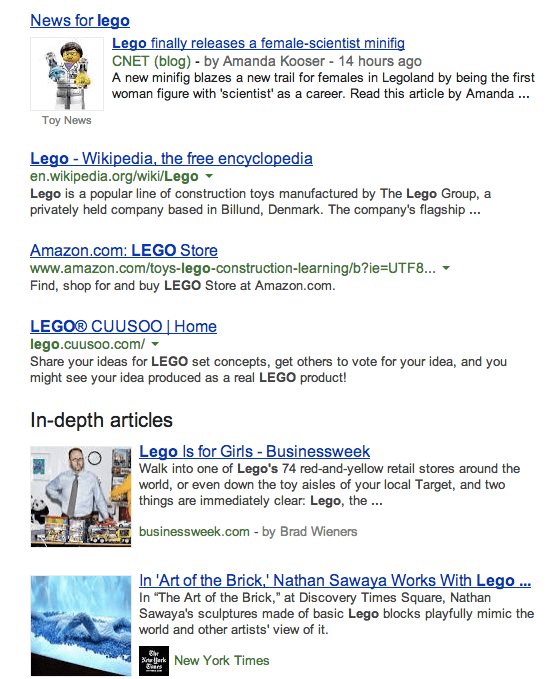In July, I decided to stop wasting my bike rides by listening to music and joined Audible. The goal? To listen to business books while I grind through a minimum of 30 miles every day.
I began by “reading” Ctrl Alt Delete and then decided I would alternate between non-fiction and fiction. After all, all work and no play makes a very boring person.
In the past two months, I’ve “read” seven books and surpassed my two books per month limit in my Audible account.
Because of my using this time to engage my brain, I’ve been able to create content for this very blog that has been smarter, richer, and more engaging…at least according to our metrics.
It has taught me that long-form content is not dead and has made me think about how to use it in combination with blog posts, videos, podcasts, and webinars.
So imagine my surprise when, Googling something for a client just a couple of weeks ago, I was presented with “in-depth articles” along with the normal news, videos, and blog posts in my search results.
Discover In-Depth Articles
On August 6, Google announced they are rolling out a feature to help you find relevant in-depth articles in your search results.
Their blog post says:
To understand a broad topic, sometimes you need more than a quick answer. Our research indicates perhaps 10 percent of people’s daily information needs fit this category — topics such as stem cell research, happiness, and love, to name just a few.
If, for instance, you search “lego,” you will find the LEGO site, store locator, and then news and in-depth articles. The articles, of course, giving you more information about how you can use LEGOs than you probably ever need.
This works for other topics such as capital punishment, the death penalty, and marketing but not (yet) for media relations or public relations.
Which means we (the industry) have an opportunity!
Create In-Depth Articles from Existing Content
I have a post-it note on my desk with topics for which Spin Sucks ranks, but may not rank on the first page of results.
It includes:
- Communication
- PR
- Public relations
- Social media
- Creative
- Reputation
- Content
- Crisis management
I did this exercise after I read Andy Crestodina’s “How to Optimize Your Blog,” which walks you through how to do this, step-by-step (I highly recommend anyone who creates content for the web do this).
The next step, of course, is to take this post-it note and find all of the blog posts that rank for each of those terms. From there, I will optimize them a bit more strategically and then use them for cornerstone content.
That content then becomes an eBook, a white paper, or an in-depth article. The goal, of course, is the latter and, if “public relations” doesn’t already have in-depth articles, why not try to get them created?
Google Authority
But that isn’t all. We know Google ranks for recency, popularity, and authority. The first two are fairly easy to understand, but until now, authority meant using your Google+ profile to boost the content you write for your own blog and for others.
It meant guest writing for high-authority sites and creating owned content that has authority based on social shares and on-page search engine optimization.
Now we have a closer glimpse into what Google means by “authority.” It means the days of “Twenty Things Twerking Can Teach You About Public Relations” go only so far. Now if you want to write that blog post (any takers??), you have to combine it with real content that shows you are an expert on either twerking or public relations (please let it be the latter).
To gain real authority in the eyes of Google, you must be an expert. Your content must be in-depth, cite sources and other experts, and link appropriately.
It’s much more difficult to game this system, which means search results are getting better and better. But it also means your content must get richer and much more informative.

